Global Accessibility Awareness Day 2020: A Publisher’s “At Home” Toolkit & Quiz
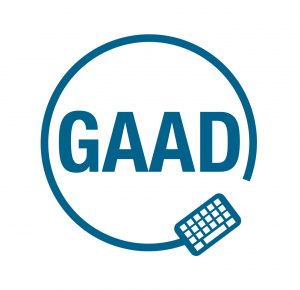 GAAD takes place on May 21 this year and we’d like to encourage all our readers to take part so that we can build awareness in our industry and play our part to increase the availability of your digital content to people with print disabilities, particularly during this challenging time when many of you are working from home. If your organization has an accessibility advocate then this is their chance to build awareness and co-ordinate activities that your teams may be able to take part in whilst self-isolating.
GAAD takes place on May 21 this year and we’d like to encourage all our readers to take part so that we can build awareness in our industry and play our part to increase the availability of your digital content to people with print disabilities, particularly during this challenging time when many of you are working from home. If your organization has an accessibility advocate then this is their chance to build awareness and co-ordinate activities that your teams may be able to take part in whilst self-isolating.
In 2019 there were some exciting events surrounding GAAD and we have put together a few ideas to help you organize something this year. It might be an event surrounding awareness building and advocacy or it might be a more technical dive into what makes an accessible ebook. Whatever you choose, please send us the details so that we can tell others about your good work and build on this for future events. Contact us here.
We have lots of ideas to get you started:
Take Our Accessibility Quiz!
How much do you know about ebook accessibility? Try out our quiz, share it with colleagues and see who is really “in the know”. This is just for fun, but you can find your score along with information about each of the questions after you finish. Easy to complete from home and very straightforward to include in a variety of activities that you may have planned. Good Luck!
The Inclusive Publishing GAAD Quiz
Awareness Building
You can easily do this from your home office so long as you and your team are online and communicating
- Put together a blog piece in advance of GAAD. This will help to raise awareness amongst your colleagues about what GAAD is all about. We have resources and tools that you can include in your post to spark interest and encourage questions! A good place to start is our Introduction to Inclusive Publishing.
- Check out your website: do you have an accessibility statement about your digital content? If not then perhaps you can set about writing something on GAAD. Have a look at the work of ASPIRE which is all about increasing the effectiveness of your organizational accessibility statement
- Hold an online social event to promote your support of accessible publishing. Set up a “party” on zoom to discuss awareness issues and next steps for your company when you return to the workplace. (Zoom offers the most accessible online conferencing experience we have found).
User Experience
GAAD is a great chance to find out for yourself what it’s like to be a print disabled reader. You can put together all manner of sessions to focus on this but here are a few ideas:
- Go mouseless for an hour—unplug your mouse and only use your keyboard (tab/shift tab, arrow keys, enter and spacebar) to navigate and interact with content.
- Experience reading using assistive technology – try 10 minutes with a screen reader for example
- You may wish to set up a UX session so that your colleagues can experience accessibility features such as Voice Over.
- Try your hand at writing image descriptions—collect a few images from the content that you publish together with some contextual information. See how your colleagues fare in writing alt text! This could be a fun challenge that would be easy or organise for those of you working from home.
Accessible EPUB
- GAAD for Geeks! If you can it would be very helpful if your technical ebook developers can run an online demonstration of what makes an EPUB accessible. The benefits of using EPUB 3 are significant for accessibility and a short presentation about this would greatly increase understanding of the technical advantages of building a11y in from the very start of the content creation process. See our top tips page for some guidance on this.
- Ask the Expert! EPUB for non-technical teams. Try running something similar for your non-technical teams. They may not need to know the technical details but will appreciate and understand information on how your content production teams are handling accessibility for mainstream product. Our EPUB resources pages for publishers will be able to give you some pointers on this.
Webinars
Encourage your colleagues to watch one of our free webinars available on the DAISY YouTube channel. We have many different sessions available already and lots more planned for the future so this would be a terrific time to ask your co-workers to choose something new and interesting. If you host a discussion following a webinar viewing you could initiate some interesting debate which we would love to hear about.
Other Events We’ve Heard About
Some of our amazing inclusive Publishing Partners have organized events for GAAD 2020 and we have listed those we know about below…please keep us updated if there are any others planned:
- Red Shelf: are running an educational session about the accessible creation and distribution of Open Educational Resources. Register for this RedShelf event here to join at 1pm CST on Thursday 21 May
- The LIA Foundation: are holding two online presentations entitled—Toward an accessible publishing ecosystem & Offering services through smartspeakers:
challenges and opportunities of a new kind of UI—both on Friday 22 May, you can register at the LIA Accessibility Days event page


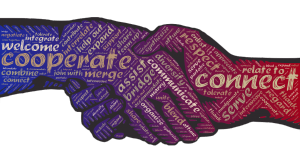
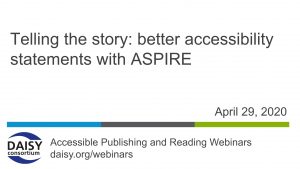
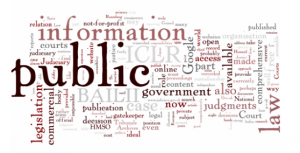 Understanding the legal framework within your own publishing market is crucial if you are going to successfully deliver born accessible content to all of your readers. It gives you the basis around which to develop an accessible publishing policy and business plan for your entire organization and for your interactions with 3rd party suppliers, vendors and partners.
Understanding the legal framework within your own publishing market is crucial if you are going to successfully deliver born accessible content to all of your readers. It gives you the basis around which to develop an accessible publishing policy and business plan for your entire organization and for your interactions with 3rd party suppliers, vendors and partners.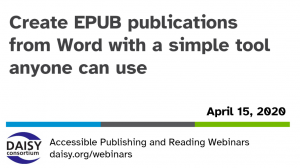 In our series of
In our series of